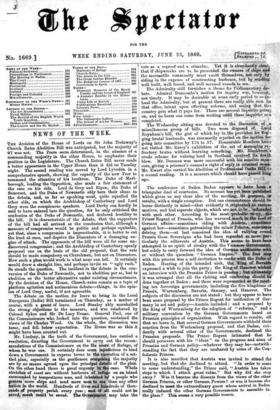NEWS OF THE WEEK.
Thu decision of the House of Lords on Sir John Trelawny's Church Rates Abolition Bill was anticipated, but the majority of 97 was not. The Peers seem determined, in the absence of a commanding majority in the other House, to emphasize their position in the Legislature. The Church Rates Bill never made a better appearance in the Upper House than it did on Tuesday night. The second reading was moved by Lord. Lyveden in a comprehensive speech, showing the capacity of the new Peer to command the attention of his brethren. The Duke of Marl- borough, leading the Opposition, also made a fair statement of the case on his side. Lord de Grey and. Ripon, the Duke of Somerset, and the Duke of Newcastle ably bore their share in the debate, and, so far as speaking went, quite equalled the other side, on which the Archbishop of Canterbury and Lord Grey were the conspicuous speakers. Lord Derby can hardly be said to have entered into the question, for he only criticised the confession of the Duke of Newcastle, and declared hostility to the bill. It is characteristic of the debate, that the supporters of the bill had all arrived. at the conclusion that, although a measure of compromise would be politic and perhaps equitable, yet that, since a compromise is impracticable, it is better to cut the knot at once, and deprive the Dissenters of a damaging en- gine of attack. The opponents of the bill were all for some un- discovered compromise; and the Archbishop of Canterbury openly proposed one on the basis of the old proposal, that the rate should be made compulsory on Churchmen, but not on Dissenters. How such a plan would work is what none can tell. It certainly would draw a straight line, and perhaps invite an "ugly rush." So stands the question. The incident in the debate is the con- version of the Duke of Newcastle, not to abolition per se, but to abolition as the better alternative under existing circumstances. By the decision of the House, Church-rates remain as a topic of platform agitation and acrimonious debate—things, in the opin- ion of Lord Grey, useful, if not agreeable.
The debate on the motion for leave to bring in the Local Europeans (India) Bill terminated on Thursday, as a matter of course, with a grant of leave. Lord Stanley ably marshalled the strong objections to the measure, and. was reinforced by Colonel Sykes and Sir De Lacy Evans. General Peel, one of the Commissioners who looked. into the question, sustained the views of Sir Charles Wood. On the whole, the discussion was tame, and fell. below expectation. The House was so thin it might have been counted out.
Mr. Lindsay, in the teeth of the Government, has carried a resolution, directing the Government to carry out the recom- mendations of the Commissioners on the Ha sours of Refuge, of whom he was one. It certainly does seem injudicious to bind down a Government in express terms to Oft 4pention of a set- tled plan, especially as the gentlemen otimAlpg• the majority are by no means agreed upon the principal downs of the plan. On the other hand there is great urgeney.iiitttIni case. Whole stretches of coast are without harbours of -*foie on an island surrounded by tempestuous seas, and inhahite4 hi a people who possess more ships and send more men 10_44 than any other nation in the world. Hundreds of lives awl isn'Areds of thou- rands of property perish every year ; sat could not be saved,Pulth noidd be saved. The Gouilixigat- may take the 1 vote as a reproof and a stimulu,. Yet it is abundautliAner, that if shipwrecks are to be prevented the owners of the mercantile community must exert themselves, net.007.,Ify aiding in the °expense of constructing harbours, but by seudrug well built, well found, and well manned. vessels to sea. • The Admiralty still furnishes a theme for Parliamentary*. bate. Admiral Duncombe's motion for inquiry was, Ilowevclk not timely. It may be desirable at some early period to haul the the Admiralty, but at present there are really able men lin that office, intent upon effecting reforms, and seeing that this country gets what it pays for. There are several inquiries going; on, and no harm can come from waiting until these inqpiries abe completed. The Wednesday sitting was devoted to the, discussion e.4..,a miscellaneous group of bills. Two were disposed of. -Livi# Raynham's bill, the gist of which lay in the Provision for tog- ging brutal husbands, was summarily rejected on the motiori fort going into committee by 174 to 57. Honourable Members bans, not visited Mr. Rarey's exhibition of the art of managing'rer. fractory brutes without learning something. Mi. Blnekbuncs crude scheme for valuing land in Scotland" received' its den,* blow. Mr. Denman was more successful with his sensible se- sure, giving a prisoner's counsel a right of reply in criminal Mr. Ewart also carried his Abolition of Professioial gaduk. ftO a second reading. It is a measure which should havegaimedloas
ago. - '


























